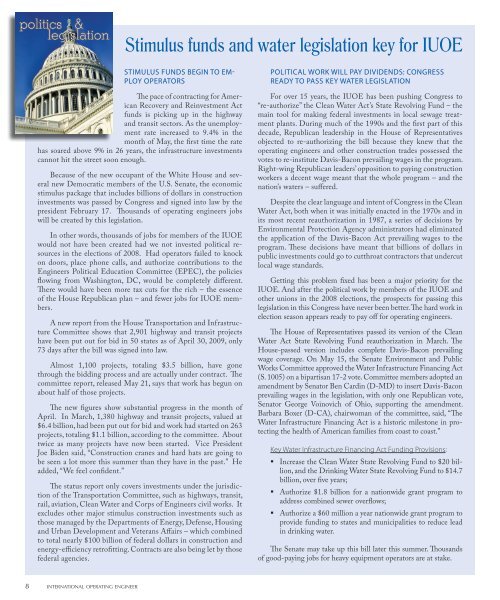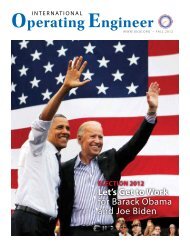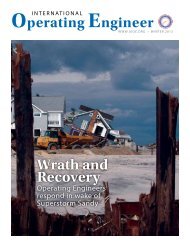Summer 2009 - International Union of Operating Engineers
Summer 2009 - International Union of Operating Engineers
Summer 2009 - International Union of Operating Engineers
Create successful ePaper yourself
Turn your PDF publications into a flip-book with our unique Google optimized e-Paper software.
politics &<br />
legislation<br />
Stimulus funds and water legislation key for IUOE<br />
Stimulus Funds Begin to Employ<br />
Operators<br />
The pace <strong>of</strong> contracting for American<br />
Recovery and Reinvestment Act<br />
funds is picking up in the highway<br />
and transit sectors. As the unemployment<br />
rate increased to 9.4% in the<br />
month <strong>of</strong> May, the first time the rate<br />
has soared above 9% in 26 years, the infrastructure investments<br />
cannot hit the street soon enough.<br />
Because <strong>of</strong> the new occupant <strong>of</strong> the White House and several<br />
new Democratic members <strong>of</strong> the U.S. Senate, the economic<br />
stimulus package that includes billions <strong>of</strong> dollars in construction<br />
investments was passed by Congress and signed into law by the<br />
president February 17. Thousands <strong>of</strong> operating engineers jobs<br />
will be created by this legislation.<br />
In other words, thousands <strong>of</strong> jobs for members <strong>of</strong> the IUOE<br />
would not have been created had we not invested political resources<br />
in the elections <strong>of</strong> 2008. Had operators failed to knock<br />
on doors, place phone calls, and authorize contributions to the<br />
<strong>Engineers</strong> Political Education Committee (EPEC), the policies<br />
flowing from Washington, DC, would be completely different.<br />
There would have been more tax cuts for the rich – the essence<br />
<strong>of</strong> the House Republican plan – and fewer jobs for IUOE members.<br />
A new report from the House Transportation and Infrastructure<br />
Committee shows that 2,901 highway and transit projects<br />
have been put out for bid in 50 states as <strong>of</strong> April 30, <strong>2009</strong>, only<br />
73 days after the bill was signed into law.<br />
Almost 1,100 projects, totaling $3.5 billion, have gone<br />
through the bidding process and are actually under contract. The<br />
committee report, released May 21, says that work has begun on<br />
about half <strong>of</strong> those projects.<br />
The new figures show substantial progress in the month <strong>of</strong><br />
April. In March, 1,380 highway and transit projects, valued at<br />
$6.4 billion, had been put out for bid and work had started on 263<br />
projects, totaling $1.1 billion, according to the committee. About<br />
twice as many projects have now been started. Vice President<br />
Joe Biden said, “Construction cranes and hard hats are going to<br />
be seen a lot more this summer than they have in the past.” He<br />
added, “We feel confident.”<br />
The status report only covers investments under the jurisdiction<br />
<strong>of</strong> the Transportation Committee, such as highways, transit,<br />
rail, aviation, Clean Water and Corps <strong>of</strong> <strong>Engineers</strong> civil works. It<br />
excludes other major stimulus construction investments such as<br />
those managed by the Departments <strong>of</strong> Energy, Defense, Housing<br />
and Urban Development and Veterans Affairs – which combined<br />
to total nearly $100 billion <strong>of</strong> federal dollars in construction and<br />
energy-efficiency retr<strong>of</strong>itting. Contracts are also being let by those<br />
federal agencies.<br />
Political Work WILL Pay Dividends: Congress<br />
Ready to Pass KEY Water Legislation<br />
For over 15 years, the IUOE has been pushing Congress to<br />
“re-authorize” the Clean Water Act’s State Revolving Fund – the<br />
main tool for making federal investments in local sewage treatment<br />
plants. During much <strong>of</strong> the 1990s and the first part <strong>of</strong> this<br />
decade, Republican leadership in the House <strong>of</strong> Representatives<br />
objected to re-authorizing the bill because they knew that the<br />
operating engineers and other construction trades possessed the<br />
votes to re-institute Davis-Bacon prevailing wages in the program.<br />
Right-wing Republican leaders’ opposition to paying construction<br />
workers a decent wage meant that the whole program – and the<br />
nation’s waters – suffered.<br />
Despite the clear language and intent <strong>of</strong> Congress in the Clean<br />
Water Act, both when it was initially enacted in the 1970s and in<br />
its most recent reauthorization in 1987, a series <strong>of</strong> decisions by<br />
Environmental Protection Agency administrators had eliminated<br />
the application <strong>of</strong> the Davis-Bacon Act prevailing wages to the<br />
program. These decisions have meant that billions <strong>of</strong> dollars in<br />
public investments could go to cutthroat contractors that undercut<br />
local wage standards.<br />
Getting this problem fixed has been a major priority for the<br />
IUOE. And after the political work by members <strong>of</strong> the IUOE and<br />
other unions in the 2008 elections, the prospects for passing this<br />
legislation in this Congress have never been better. The hard work in<br />
election season appears ready to pay <strong>of</strong>f for operating engineers.<br />
The House <strong>of</strong> Representatives passed its version <strong>of</strong> the Clean<br />
Water Act State Revolving Fund reauthorization in March. The<br />
House-passed version includes complete Davis-Bacon prevailing<br />
wage coverage. On May 15, the Senate Environment and Public<br />
Works Committee approved the Water Infrastructure Financing Act<br />
(S. 1005) on a bipartisan 17-2 vote. Committee members adopted an<br />
amendment by Senator Ben Cardin (D-MD) to insert Davis-Bacon<br />
prevailing wages in the legislation, with only one Republican vote,<br />
Senator George Voinovich <strong>of</strong> Ohio, supporting the amendment.<br />
Barbara Boxer (D-CA), chairwoman <strong>of</strong> the committee, said, “The<br />
Water Infrastructure Financing Act is a historic milestone in protecting<br />
the health <strong>of</strong> American families from coast to coast.”<br />
Key Water Infrastructure Financing Act Funding Provisions:<br />
• Increase the Clean Water State Revolving Fund to $20 billion,<br />
and the Drinking Water State Revolving Fund to $14.7<br />
billion, over five years;<br />
• Authorize $1.8 billion for a nationwide grant program to<br />
address combined sewer overflows;<br />
• Authorize a $60 million a year nationwide grant program to<br />
provide funding to states and municipalities to reduce lead<br />
in drinking water.<br />
The Senate may take up this bill later this summer. Thousands<br />
<strong>of</strong> good-paying jobs for heavy equipment operators are at stake.<br />
8<br />
i n t e r n at i o n a l operating e n g i n e e r













